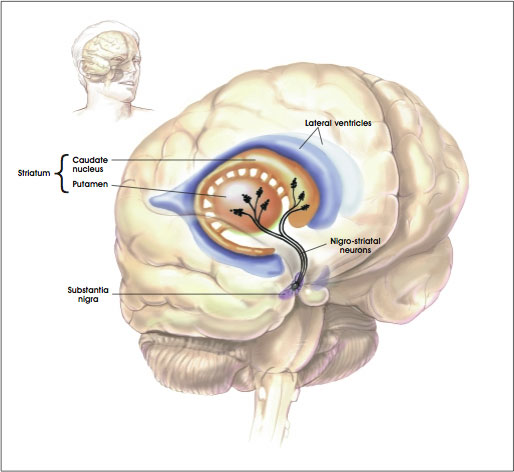Parkinson's
Disease
Symptoms,
Causes, and Treatments |
 |
What
is the Cause of Parkinson's Disease?
Parkinson's disease is a degenerative condition where
the brain starts to loose cells which produce dopamine.
It usually occurs in patients over the age of 50. With
advancing age the prevalence of the disease increases.
There are patients who have Parkinson's disease under
the age of 50 but it is a very rare condition. |
What are the
symptoms of Parkinson's disease?
There are four main symptoms of Parkinson's disease. This
includes tremor, which could occur in any of the limbs and
even involve the head and face. The tremor usually starts
in one limb and over time progresses to the other limbs.
The tremor usually occurs when the limbs are at rest. Another
symptom of Parkinson's disease is rigidity or stiffness
of the limbs. The patients also start to have slowness in
their movements which is known as bradykinesia. The family
and the patient start to notice that it takes the patient
longer periods of time to do their usual activities.
The
patient's notice that they start to loose their balance
and walking becomes more difficult. They start to take small
steps and walk slower than before. Not all of these symptoms
need to be present for the diagnosis of Parkinson's disease
to be made. There are other associated symptoms with Parkinson's
disease which include depression, difficulty swallowing,
difficulty in speaking and a soft voice, chewing difficulties,
urinary problems and constipation, and difficulty sleeping
and nightmares.
How is the
diagnosis made?
The diagnosis of Parkinson's disease is made by the symptoms
that the patient presents with and the physician's examination
of the patient. The essential factor is to make sure that
the patient doesn't have another condition that is mimicking
Parkinson's disease, since many other diseases might look
like Parkinson's disease. The workup that is generally done
is to exclude other diseases that might be mimicking Parkinson's
disease. Making the right diagnosis is an essential part
of the process given that the right diagnosis will be needed
for deciding on the proper treatment.
What are the
different treatments for Parkinson's disease? There are currently no cures
available for Parkinson's disease. However there are a wide
variety of treatment for Parkinson's disease which could
be used to dramatically improve the symptoms. Since Parkinson's
disease is caused by a decrease in the amount of dopamine
in the brain, most of the treatments are aimed at increasing
dopamine. These drugs include synthetic dopamine which includes
different forms of Sinemet. The second class of drugs include
drugs that are similar to dopamine but are not dopamine
itself, the most popular one is Mirapex.
Another class of
drugs are drugs which prevent the breakdown of dopamine
in the body; they indirectly increase the body's dopamine
levels. Another class of drugs decreases the amount of acetylcholine
in the brain. They also tends to help Parkinson's patients.
Which drugs will be used has to be determined by the neurologist
depending on the patient's characteristics and the side
effect profiles of the drugs. In the hands of an expert
most patients with Parkinson's disease will have very good
control of their symptoms for years.
What
happens if medications don't work?
There are now very effective surgical options which could
be used in patients in which drugs stop being effective.
In the surgery, a technique is used where an electrode is
implanted in the brain. This technique is called deep brain
stimulation. With proper patient selection, patients could
have reduction of their symptoms where drugs stopped being
effective. The patient could have better control of their
symptoms with lower doses of medication.
What is the
prognosis?
The symptoms of Parkinson's disease start slowly and progress
over time. Every patient has a different rate of progression.
Although some people become severely disabled, others have
minor symptoms. Tremor is the major symptom for some patients,
while for others tremor is only a minor complaint and other
symptoms are more troublesome. No one can predict which
symptoms will affect an individual patient, and the intensity
of the symptoms also varies from person to person.
|

 Parkinsons Disease
Parkinsons Disease

